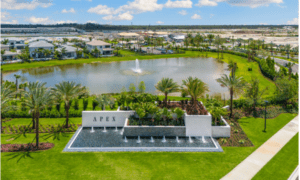In Hong Kong’s ultraluxury real estate market, properties that once commanded record-breaking prices are now changing hands at steep discounts, sometimes as much as 50% below their 2018 peak values. This trend, while presenting opportunities for cash-rich buyers, is also a potential deeper issue for some owners of these properties: They’re facing a liquidity crunch, forcing them to divest prized assets at a potentially inopportune time while other investors are buying the bottom.
EquitiesFirst, a provider of equities-based financing, could give owners and investors faced with this dilemma access to capital to ride out a downturned market amid optimism that Hong Kong will follow the U.S. and begin to decrease interest rates.
The Current State of Luxury Real Estate in Hong Kong
The past year has seen a flurry of distressed sales in Hong Kong’s most exclusive neighborhoods. In July 2024, Houses A to D at 26 Plantation Road were sold for 1.1 billion Hong Kong dollars (approximately $141 million), a 35% discount to market prices. Reports indicated that the sale was brought on by the need to repay a HK$1.6 billion private loan secured against the property.
In May, an ultraluxury mansion connected to a senior executive of China’s bankrupt property giant Evergrande Group was seized by receivers and sold for HK$450 million — over 40% below its 2023 valuation.
These aren’t isolated incidents. CBRE Group reports that around 75% of properties valued over $10 million sold in the first half of 2024 involved cash-strapped sellers.
According to international property agency Savills, properties on the Peak, Hong Kong’s most exclusive neighborhood, were sold at prices averaging 46% below their COVID-era valuations in the three months ending July 2024. Savills attributed the sales to several cases in which owners were forced to settle outstanding debts.
There’s also been a slowing in investment from mainland China, says Jack Tong, the Hong Kong director of research at Savills.
“The lack of ultra-high-net-worth mainland tycoons due to slower China economic growth and stricter capital outflow restrictions meant no more record-breaking prices registered for the sake of trophy assets as in the pre-COVID period,” Tong told Business Insider.
Reversing the Market Downturn
Several interconnected factors have contributed to the state of Hong Kong’s luxury real estate market, but there are recent signs of a reversal of the market downturn.
The U.S. Federal Reserve’s aggressive rate hikes have had a ripple effect on Hong Kong due to its currency peg to the U.S. dollar. Reeves Yan, head of capital markets at CBRE Hong Kong, points out that the cost of borrowing in Hong Kong has risen above its 3% average rental yield.
But the Fed’s decision to start cutting interest rates in September 2024 could pave the way for more manageable loan repayments and potentially spur demand.
Meanwhile, the Hong Kong government’s decision to abolish stamp duty and ease mortgage restrictions in April 2024 led to a significant uptick in transactions. Residential home sales jumped 114% in April to 8,970 units from 4,186 in March, according to global real estate firm Knight Frank Greater China. The government’s willingness to support the property market could foster increased confidence among investors and homebuyers.
And while international economic uncertainty surrounding interest rates and inflation persist, Hong Kong’s enduring status as a worldwide financial hub and its limited land supply could continue to underpin its long-term attractiveness for luxury properties. There are signs that this remains the case. As Lucia Leung, director of research and consultancy at Knight Frank, notes, the rental market has remained relatively stable, supported by an influx of professionals. Knight Frank predicts an increase in luxury residential rents of up to 5% this year, indicating ongoing demand for high-end properties.
Analysts at Goldman Sachs expect Hong Kong home prices to bottom out this year, before reversing direction. The fundamentals that have historically driven Hong Kong’s high property values, including limited land supply in prime areas like the Peak, remain intact. As the market absorbs excess inventory and new supply becomes constrained, the supply-demand balance could shift in favor of sellers, supporting price appreciation.
The Case for Equities-Based Financing
Given these market dynamics, the key question for investors and entrepreneurs is: How can investors ride out this challenging period without resorting to distressed sales? One potential solution gaining traction is equities-based financing.
This model, offered by specialty financing firms like EquitiesFirst, allows entrepreneurs and investors to leverage their shareholdings in public companies to obtain capital.
EquitiesFirst enables borrowers to retain exposure to their long-term equity holdings while gaining access to short-term liquidity to help cover costs in a downturned market. Property owners could avoid selling real estate at below market values, maintaining their positions for potential future appreciation.
With predictions of a market bottom in 2024 followed by a potential reversal, equities-based financing could help investors weather the storm until more favorable selling conditions emerge. It could also help diversify or increase positions to take a long-term position in the broader Hong Kong market.



































